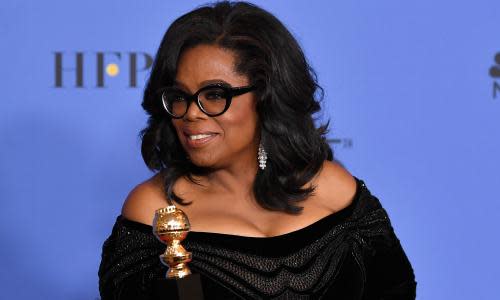Oprah Winfrey for president? The idea reveals an uncomfortable truth | Briahna Joy Gray

During the 2016 elections, Democrats insisted that competency is essential in any presidential candidate. That is sounding more than a little hypocritical now
On Sunday night, Oprah Winfrey gave a stirring speech at the Golden Globes in which she inveighed against ubiquitous sexual abuse, warning abusers that “their time is up”. Many people appreciated the speech for what it was: an important spotlight on the ways sexual assault hurts not only women in Hollywood, but domestic workers, Olympians, soldiers, scientists, factory workers and others across class strata.
It was difficult to ignore that in addition to a heartfelt message of solidarity, Oprah projected dignity, poise, and an air of hopefulness which felt unfamiliar a year into Trump’s presidency. Perhaps for that reason, it occurred to thousands of viewers that Oprah Winfrey might be the 2020 candidate the Democrats have been looking for.
Celebrities ranging from Sarah Silverman to Aasif Mandvi tweeted their support of #Oprah2020, joining a chorus of pundits like Joy Ann Reid and Shaun King. Even Bill Kristol tweeted #imwithher in support of Oprah’s candidacy, proving she has bipartisan appeal.
Notably, NBC seemingly offered its endorsement, tweeting: “Nothing but respect for OUR future president” – a tweet which received over 20,000 favorites before it was deleted the next day.
Certainly, many of these “endorsements” were offered in jest. And I’m sympathetic to those who, desperate for inspiration, would revel in the fantasy that, instead of Trump, someone as likable and respectable as Oprah could occupy the Oval Office as she’s occupied America’s living rooms.
But the enthusiasm around the mere specter of Oprah’s presidency reveals an uncomfortable truth about the hypocrisy of Democrats: all the talk of competency during the 2016 presidential election, qualifications, be they ideological or political, are mere pretexts for their choice of candidate.
In the buildup to and aftershock from the 2016 election, perhaps the loudest and most consistent protest heard from Hillary Clinton supporters was “but she’s the most qualified!” Despite having a longer record of public service, Senator Bernie Sanders was deemed less, and by some, insufficiently qualified to run for president. His relative inexperience with foreign policy was a point of regular critique, and those who supported his candidacy on ideological grounds were dismissed as “purists” who didn’t understand the real “work” of being president.
In fact, Sanders’s candidacy arguably took its biggest hit when he suggested that Clinton’s history of poor political judgments, like her vote for the Iraq war, disqualified her for the presidency. Hillary’s qualifications were considered so unassailable, that to challenge them was considered de facto sexism by many.
Yet somehow, within a year of Trump’s inauguration, a not-insignificant segment of Democratic voters (or at least tweeters) have swung from fetishizing “qualifications” to adopting the Republican line on celebrity candidates whole cloth.
Like Trump, Oprah’s professional and financial success are meant to be taken as indicia of her political prowess. Despite Hillary’s wooden delivery, being a “great communicator”, is now of paramount importance.
Where Clinton could be forgiven for her vacillating positions on the war in Iraq and the TPP, what matters now above all else is good judgment. Where Bernie’s policy proposals were maligned as inadequate fantasies akin to promising everyone a “pony”, Oprah inspires on the basis of her personality alone.
Like many of those who have endorsed Oprah’s potential 2020 candidacy, I share the view that ideology and judgment should play a greater role in our choice of leadership than mere political experience. Presidents have an incredible influence over our political imagination: they teach us what is possible, and have the power to expand or limit our political expectations.
For this reason, I voted for the candidate who advocated for Medicare for All over the one who preached that single-payer would “never, ever come to pass”. But ideology is not identity. And identity, whether based in race, gender or celebrity, is not enough.
What Democrats need is a candidate who is willing to back the myriad progressive issues which have long been supported by the majority of Americans, and who will gladly trade political expediency for popular support.
Perhaps Oprah Winfrey is one such candidate. But given that Oprah’s political identity is largely a blank slate, (with some questionable blemishes that bear some inquiry), anyone who pretends to know she’s “qualified” based on her public persona alone is all talk, no show.
Briahna Joy Gray is a contributing editor at Current Affairs
